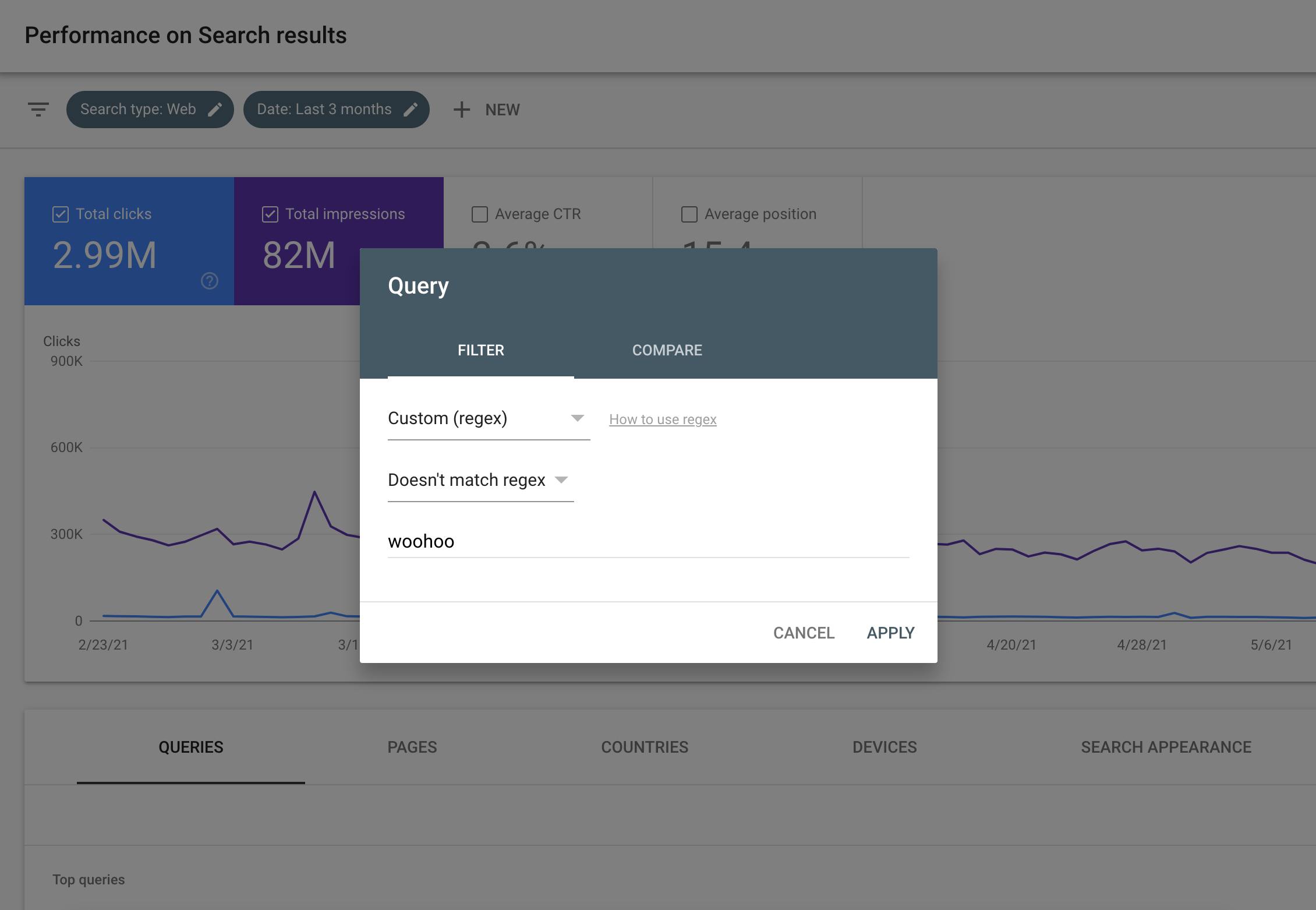Mercoledì 2 giugno 2021
Di recente abbiamo annunciato un filtro dei dati migliorato per i report sul rendimento di Search Console e siamo stati lieti di vedere la reazione della community a questa comunicazione.
Come sempre, abbiamo analizzato con interesse il feedback ricevuto e abbiamo notato molte richieste di aggiungere un'opzione di corrispondenza esclusa al filtro basato su espressioni regolari (regex).
La buona notizia è che, a partire da oggi, il filtro del report sul rendimento supporta i filtri regex basati sia su corrispondenza che su corrispondenza esclusa. L'opzione è disponibile tramite un menu a discesa secondario, che viene visualizzato dopo aver selezionato l'impostazione "Personalizzata (regex)" nel selettore di filtri, come illustrato nello screenshot di seguito. Scoprite di più su come filtrare i dati sul rendimento della ricerca.

Suggerimenti rapidi sull'utilizzo di regex in Search Console
Abbiamo anche pensato che sarebbe stato utile fornire qualche suggerimento rapido che potrebbe servirvi se siete alle prime armi con le regex.
Innanzitutto, che cos'è un'espressione regolare? In poche parole, si tratta di una sequenza di caratteri che specifica uno schema di ricerca; potete utilizzarla per creare filtri avanzati in modo da includere o escludere parametri più complessi e non solo una parola o una frase. Quando utilizzate regex, potete usare diversi metacaratteri, ovvero caratteri con un significato speciale, ad esempio che potrebbero definire un criterio di ricerca. Consultate il riferimento per la sintassi regex RE2 per un elenco di tutti i metacaratteri supportati da Search Console.
Se vi state chiedendo quando utilizzare regex invece di altri tipi di filtri, ecco alcuni esempi che rispondono a questa domanda:
- Segmentare gli utenti che conoscono già il vostro brand: utilizzate una regex che specifichi più varianti del nome dell'azienda, inclusi gli errori di ortografia. Ciò vi consentirà di scoprire quale tipo di query viene utilizzata da ciascun gruppo e quale sezione del vostro sito web attira ogni segmento di pubblico.
Ad esempio, se il nome dell'azienda è
Willow Tree, vi consigliamo di creare un filtro per tutte le varianti come questo:willow tree|wilow tree|willowtree|willowtee(il metacarattere|rappresenta un'istruzione OR). - Analizzare il traffico verso una sezione del sito web: utilizzate una regex che si concentri su directory specifiche del vostro sito web; ciò può aiutarvi a comprendere quali sono le query comuni per ciascuna delle aree di contenuti. Ad esempio, se la struttura dell'URL è
example.com/[product]/[brand]/[size]/[color]e volete visualizzare il traffico verso delle scarpe di colore verde, ma non vi interessa il brand o il numero, potete utilizzareshoes/.*/green(.*corrisponde a qualunque carattere per un numero qualsiasi di volte). - Comprendere l'intento degli utenti: utilizzate una regex per analizzare i tipi di query che portano gli utenti a sezioni diverse del vostro sito web.
Ad esempio, potrebbero interessarvi le query contenenti parole che introducono una domanda; un filtro di query
what|how|when|whypotrebbe mostrare risultati che indicano che i vostri contenuti dovrebbero rispondere facilmente alle domande, magari tramite una sezione di domande frequenti. Un altro esempio potrebbe essere costituito da query contenenti (o non contenenti) parole relative a transazioni qualibuy|purchase|order. Inoltre, con queste espressioni potreste controllare quali sono i nomi dei prodotti utilizzati più spesso o più raramente.
Consultate il Centro assistenza Search Console per conoscere altre espressioni regolari comuni. Se avete altri esempi interessanti per l'utilizzo di regex, condivideteli su Twitter con l'hashtag #performanceregex.
In caso di dubbi o domande, rivolgetevi alla community di Google Search Central o scrivete su Twitter.
